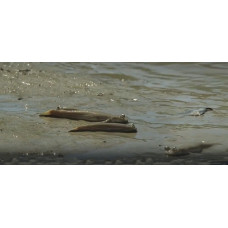Latin name
Anableps microlepis
Other name
Anableps microlepis
Identification
Anableps: Greek, ana = up + Greek, blepo, blepsis, -eos = glance, sight.
The elongated cylindrical body of this fish is surmounted by a flat head with convex eyes. The finescaled four-eyed fish can be distinguished from the sympatric Anableps anableps by the finer and more numerous scales (76-83 compared to less than 64 in A. anableps). They also have a gonopodium that is tilted to the left or right, as in other members of the Anablepidae.
Features of fish fins
The pectoral fins of this species are thick and broad, while the dorsal fin is small and close to the tail.
Fish colouring
The colouration of the Finescaled four-eyed fish is darker on the back (brown-green to grey), light grey on the sides, with one or more longitudinal stripes.
Distribution
Finescale four-eyes are common in the coastal waters of the Atlantic Ocean from Trinidad and Tobago to south-eastern Brazil.
Habitat
Tropical freshwater benthic species. They live mainly in brackish environments such as estuaries, mangrove swamps and tidal mudflats.
Size
Maximum length of males of this species is 32.0 cm, total length is 15.0 cm. Maximum recorded weight: 500.00 g.
Behavior
Non-migratory, gregarious species, but may be found in more restricted groups of a dozen or so individuals. It may also be found solitary or in pairs.
Food and feeding habits
This fish feeds mainly on organic matter and small invertebrates. In Manzanilla it has been observed feeding on sand crabs (Emerita portoricensis) and small mussels (Donax denticulatus). They move along the coast in large groups of a dozen or more than a hundred fish in search of food.
Reproduction
Finescale four-eyed fish give birth to live calves.
Fishing
This species is not commercially important.
Relationship with a person
A finescaled four-eyed fish sometimes sold in the aquarium trade. It is used in eye research because of its split cornea, which projects two images onto the retina.
Interesting facts
The eyes of the Finescaled four-eyed fish are quite unusual. These fish can see both in the water and in the air. Their eyes are divided into two parts by a horizontal septum. The septum divides the lens, iris and cornea. The result is actually four eyes. The lower part of the lens is more convex, allowing the fish to see underwater; the upper part is flatter, allowing it to see well in the air. And because the Finescaled four-eyed fish spends most of its time on the surface, the upper part of the eye is protruding, allowing it to follow enemies and prey simultaneously in the air and underwater.
| Classification | |
| Phylum | Chordata |
| Class | Actinopterygii |
| Squad | Cyprinodontiformes |
| Family | Anablepidae |
| Genus | Anableps |
| Species | A. microlepis |
| Features | |
| Conservation status | Least Concern |
| Habitat | Bottom |
| Life span, years | No information |
| Maximum body weight, kg | 0,5 |
| Maximum length, cm | 32 |
| Sailing speed, m/s | No information |
| Threat to people | Edible |
| Way of eating | Planktonophage |



